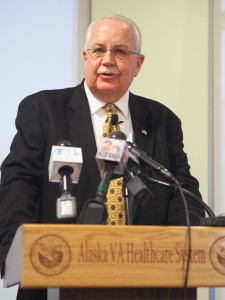
Veterans in Alaska will soon have more help making medical appointments and navigating health care. The third party contractor handling the bulk of appointments for veterans across the state is adding personnel to better handle problems that have arisen in the last year and a half.
After Congress passed new legislation in 2014 designed to reduce wait times for medical care, many veterans in Alaska experienced the opposite.
Part of the problem, according to Dr. Linda Boyle, interim director of the Department of Veterans Affairs in Alaska, was that anyone calling to make an appointment was routed through ill-equipped call centers.
“In Alaska they had to call people that lived in Louisiana,” Boyle said during a Tuesday news conference. “We recognize that those individuals don’t really understand the geography or unique challenges of Alaska.”
Since then, a new call center has been built in Walla Walla, Washington and in an effort to adapt federal legislation to local realities, six new employees from the third-party contractor, TriWest, have been “embedded” within the Alaska VA. Almost all of them started work Monday.
TriWest is paying the salaries of those new employees, with no additional appropriations from the VA, according to retired Army colonel Hal Blair, program director for TriWest, and formerly the deputy director of the Alaska VA.
“TriWest has come to understand that there’s a different footprint required here,” Blair said, explaining why the company has had to take the unusual step of adding local staff.
The changes came in response to criticism from veterans and the state’s congressional delegation. U.S. Sen. Dan Sullivan wrote in an email that changes are, “An encouraging, albeit small first step.”
The additional staff will have an impact primarily on veterans living on the road system. Rural vets accessing care through local facilities will not see any changes in their care options.
